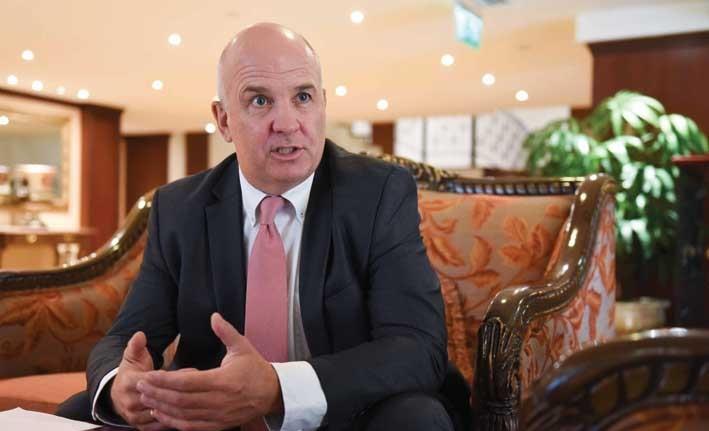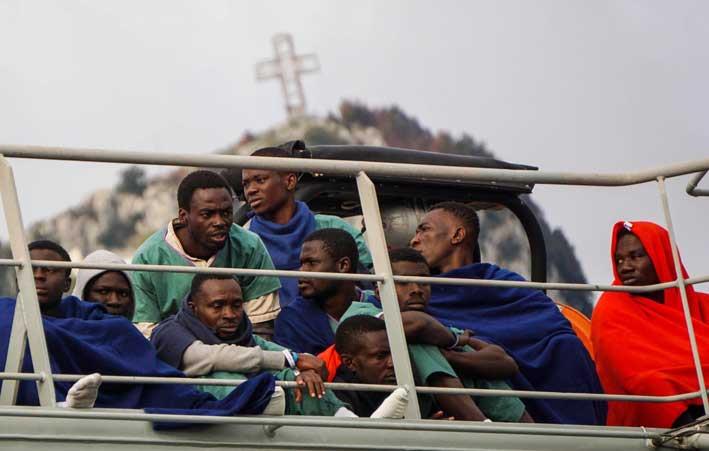A journalist was assassinated in Malta in the last couple of weeks, which follows a pattern of journalists being attacked all over Europe, like Italy, Azerbaijan and Russia. What is the state of the freedom of the press in Europe?
We should be very worried because there have been a series of attacks and threats against journalists, not only here, but in Italy, throughout the western Balkans, Eastern Ukraine, Azerbaijan, and Russia. The frequency of attacks and the inadequate government response is a concern,
because in very many contexts, there are certain governments which are not unequivocally condemning the attacks. There are no effective investigations, and there are no punishments.
Another big area of concern is the abuse of defamation laws to silence journalists, which is an issue that was raised here by a number of journalists I met with over here. There are also issues when it comes to restrictions on internet freedom. For example, in recent reports on Turkey and Azerbaijan, we found the intentional slowing down of the internet or arbitrary blocking of web pages and social media media platforms.
The situation is particularly worrying because this has broader effects on human rights in general. If journalists cannot do their jobs, they cannot expose human rights abuses and keep government accountable.
What is concretely being done by the Council of Europe to remedy the situation?
The Council of Europe and my office do a number of things. Firstly, we have a platform for the protection of journalists were alerts are posted by media organisations and governments feel compelled to respond. My office also does a lot of monitoring of media freedom if the issue is problematic within a particular country.
When we discussed Malta we focused on issues concerning gender equality and migrants rights as before the murder of Caruana Galizia, there were no alarm bells ringing over the situation here. I have held a number of meetings since then and I have learned a lot. There is work to do be done, and we all hope that this was an exceptional case and not symptomatic case.

When does freedom of speech crossover to hate speech?
With regards to hate speech there are standards such as case law and recommendations; but basically it is if you call for discrimination or violence against someone, which is unacceptable. However, it is always context dependant. Is it a right wing extremist speaking or is it an academic? Is it a politician or somebody on the street? What is the purpose of this speech?
Pilatus Bank has threatened Maltese media houses with multi-million dollar lawsuits in the United States; can you comment? How can press freedom be maintained in the face of multinational million dollar companies?
From my discussions I understand that there are several taboo topics in Malta; Pilatus Bank, Henley and Partners, and abortion. With regards to the first two, it is because of the threat of defamation. It is difficult for me to comment on the individual workings of a bank, but it is regrettable that journalists are hesitant to write about the bank out of fear of defamation. This is a matter of public interest, and it will be subject to discussion next week in the European Parliament. I hope that Pilatus Bank will allow people to do their jobs.\
What sort of support can journalists on a smaller local context get to face up?
I was really struck that there seems to be not one organisation that unites all of the journalists and promotes professional solidarity and defends their common interests. This is crucial. It seems to me that regardless of political leanings, ownership, agendas, and so on, all the media houses have common interests, such as facing defamation as little as possible, having access to government information, and to have the government and police respond robustly to any threats or intimidation made towards journalists.
The second path of course is international solidarity, through your colleagues all over Europe or international organisations like the Council of Europe, the OSC, and the UN.

Thousands of migrants are being held in dozens of detention centres in Libya, some run by smugglers and some by the UN-backed government, either after being stopped on trafficking routes inside Libya or rescued inside Libyan coastal waters as they attempt the perilous crossing to Europe with funds provided by the EU. These detention centres have long been accused of committing human rights abuses and have left the migrants subject to inhumane working conditions. How can this be curtailed? Are we struggling to find a political or moral solution to the refugee crisis?
I work within the 48 member states of the Council of Europe, so Libya is not part of my mandate. I do engage with the Italian authorities, the specifically Minister of Interior, to keep updated with the relationship with the Libyan authorities and to ensure that obligations are being kept. It is clear that every state has the obligation under the refugee convention to provide access for people to make asylum claims
In 2017, 150,000 migrants have arrived by sea according to UNCHR figures. Of these arrivals, only 10.4% are Syrian, while 4.4% are Iraqis. The most are from Nigeria with 12.1%. It appears that a majority of arrivals are not coming from ‘conflict zones’. How can we create a distinction between economic migrants and asylum seekers? And do you think something needs to be done to deal with irregular economic migration specifically?
I think everybody is entitled to an individual hearing. You have to assess each case individually, it could be that the country is safe for most people but it is not safe for certain religious, ethnic groups, LGBTI persons. It’s clear that an effective returns policy is vital to any functioning asylum system, and here, in Europe, there’s a lot of work to be done, which can only be achieved by working together; by putting economic, political, diplomatic pressure on countries that do not cooperate in receiving back their nationals, who are no longer under threat or need international protection.
We also need to thinking about short-term labour migration and the possibility of making it legal. We will not be able to stop the flow of people, so we need to manage it. There are many migrants who do not need protection, but upon which many sectors of the European economy depend, like agriculture. Too many people are asking for asylum when the system is not made for them; we need to start having an open discussion on this possibility.
Is the issue of modern day slavery, or the exploitation of migrants, high on the council’s agenda?
When we look at migration we also take human trafficking into account, which is the movement of people for exploitation, typically either for sex or labour. There is a whole monitoring organisation which looks at this; but beyond identifying those who may vulnerable to exploitation, we need to examine what kind of integration policy is in place, so that people are not exploited by the labour market. Is there a labour inspector looking out for these issues? Do migrants who have an irregular status have an opportunity to lodge a complaint without fear that they will deported?

On the subject of human trafficking, the Maltese government will start a debate soon on the regularisation of prostitution, which proponents say helps the issue. However, there are also studies which claim the exact opposite. In your opinion, does the regularisation or legalisation help the situation?
To be honest, I have not looked at this issue systematically in different countries. I have heard different opinions, and to be honest it is not something I have focused on, but there seems to be a debate on the issue in the human rights community.
The Marsa Open Centre has been a failure when it comes to integrating asylum seekers, refugees, and migrants; with the area becoming ‘ghetto-ized’ and socially deprived. Are the needs of the individuals forgotten once they enter the country? What sort of integration policy would you like to see? Have you spoken to the government about this issue?
I finally sense a recognition that there is a need a long-term integration policy on the island. I want to see a more systematic policy which covers all migrants. I want to see the systematic teaching of the Maltese and English languages to refugees, asylum seekers, and migrants. I want to see labour market facilitation for these individuals, and proper monitoring to ensure they are not exploited. However, we also need to work within local communities and the majority population to address prejudices.
These people are here to stay, and if you help them find their way, they will become loyal residents who pay taxes.
There are also issues concerning reunification of families. Many Syrians only have subsidiary protection and do not qualify for family reunification. How can a person even begin to think about integration when the rest of their family and loves ones are in a camp in Lebanon somewhere.
I do sense that after many many years there is political will to finally move this issue forward from the times when people did not even want to acknowledge the need for an integration policy.